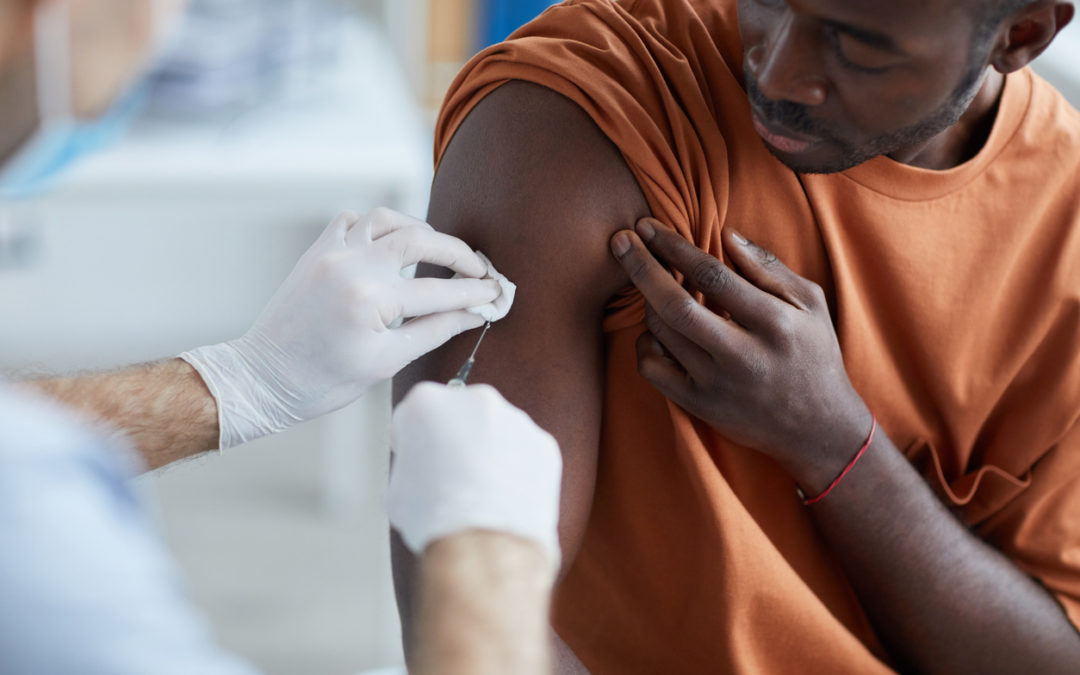Patricia Cummings, BSN, RN, had an experience that most other nurses don’t get. She gave the COVID-19 vaccine to Vice President Kamala Harris and her husband, Second Gentleman Doug Emhoff. Cummings, a student in Walden University’s Master of Science in Nursing program and clinical nurse manager at United Medical Center says that it was a phenomenal experience, but also acknowledges how the Black community is facing challenges with people receiving the shot.
“My experience of being able to inoculate Vice President Kamala Harris and her husband was truly humbling and exciting. I feel honored that I was given an opportunity to be a part of history, as Vice President Harris is the first woman and the first African American and Asian American person to be appointed to that role. It is certainly one of the greatest highlights of my nursing career thus far,” says Cummings.
But she says that, initially, even she, a nurse, was hesitant about getting vaccinated. “I wanted to conduct my own research on the scientific background of the vaccine as well as speak with colleagues who are experts in the fields of infectious diseases and epidemiology. After reviewing the results of the clinical trials and the vaccine production process, I was convinced about the efficacy and safety of the vaccine, and hence decided to take it,” Cummings explains. “As the mother of two children, we have had to make several adjustments in our socialization, schooling, and other activities. I desire to return to a level of normalcy in my personal life, and I understand that getting vaccinated is presently the only viable solution to avoid contracting and spreading the virus. I am also saddened at the hundreds of thousands of lives lost as a result of the virus and am anxious to seeing the pandemic come to an end.”
Cummings says that one of the biggest challenges facing the Black community is having access to the virus. “Until recently, the vaccine was only accessible at a few hospitals and clinics that are typically far and inaccessible. Additionally, the registration process has been arduous and often requires one to be computer literate, as many sites require registration via the internet,” she says.
However, this isn’t the only reason why BIPOC are hesitant to get vaccinated. History has scared many people. “Hesitancy in the BIPOC population is primarily attributed to their distrust in the U.S. health care system. Historical events such as the Tuskegee Experiment, in which Black men were deceived regarding treatment for syphilis, have had lasting effects on the BIPOC community,” says Cummings. “Additionally, many have expressed skepticism about the short timeframe in which the vaccine was created and the fact that, at first, the only available vaccines required two doses.”
Cummings suggests that nurses can help alleviate patients’ fears because they’ve tended to be seen as people whom the BIPOC can trust as providing information. “Nurses should therefore provide factual information about the efficacy and safety of the vaccine based on their understanding of the clinical trials, as well as the vaccination process thus far,” she says. “Additionally, they should promote vaccination as a part of primary prevention, health, and wellness.”
Building trust in the community she serves is something that Cummings works on regularly. “As a student at Walden pursuing my MSN in the Nurse Executive program, I have learned the importance that the role of a leader as a change agent plays in influencing others to make beneficial choices. I have therefore chosen to put significant effort into sharing information about the vaccine’s efficacy and safety in hopes of building trust in my community,” says Cummings. “I also share my own vaccination experience and am transparent about my initial hesitancy. Additionally, I participate in community events that afford me a voice to safely share information and answer questions in real time.”
Another problem, though, faces certain minority communities—not speaking the same language. “One challenge that I believe exists among Hispanics and other non-English speaking populations is a language barrier. I have not seen adequate advertising and information provided in languages other than English. I believe that it is imperative that vaccine information is presented in a manner that is comprehensible to all people,” says Cummings. “It is important to add that I am passionate about health promotion and wellness. I believe that all people should be able to make informed decisions. My goal is not to strong-arm anyone into accepting the vaccine, but merely to provide them with truthful information and my own experiences in hopes that they make wise choices.”
- What an MSN Can Do for You - October 18, 2023
- The National League for Nursing: Connecting the Academic and Clinical Worlds for 130 Years - August 16, 2023
- Treating Burnout, Trauma, and Grief with Dance - July 14, 2023




